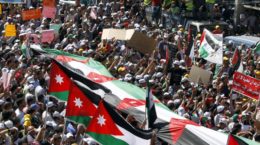In 2012, I published an academic paper titled “Between Sanctity and Liberty” which explored the conflicts and contradictions between the concepts of liberty and religious taboos and the potential impact on individuals and social stability. Following the assassination of the Jordanian writer Nahed Hattar in September 2016, this issue became particularly sensitive and requires a change in the way the Jordanian authorities approach it.
Nahed Hattar was assassinated for sharing a cartoon considered offensive to Islamic values on social media. The government’s approach was to charge Hattar with the crime of inciting “sectarian strife and racism” in violation of article 150 of the Jordanian Penal Code, which punishes any form of speech that drives sectarian or racial prejudices or incites conflict between different sects. He was also charged for violating article 278 of the Jordanian Penal Code, which prohibits the publication of printed material, image or drawing intended to offend religious beliefs. Hattar was detained for a week following the criminal charges. Given that Hattar was a Christian, this approach framed the whole affair as a conflict between Christians and Muslims.
More recently we have seen a similar case where a website published a cartoon offensive to Christian values and the publisher and owner of the website were similarly detained. These incidents are likely to continue to occur, so we need a new approach to dealing with them that does not negatively impact the fabric of society, we need a new approach that promotes interfaith peace and stability in Jordan.
Given the current approach promotes the fragmenting of society, we need a new approach to national laws and norms that promotes a national identity so Jordanians have a shared framework with laws that promote shared cultural norms. As long as Jordanians feel they are represented within their own society through their religious identity, our society will remain fragmented. We must look to our history to understand how we arrived here in order to understand it and build a new path.
A weak national identity has pushed people to identify under other banners such as religion, sectarian and geographic. National identity is the major unifying identity of any society and is fundamental to stability and harmony in a society. Psychologically, humans have a need to identify with a group in order to understand themselves and their place in the world. A strong national identity taps into that desire and brings people together under shared values and becomes the foundation of a strong society. A lack of national identity will push people to find other alternative features to identify under, and will often cause conflict in a society as people identify their identity in group as opposed to others. This is the risk we face today with religious identity becoming the strongest identifier of people in Jordan, which will inevitably drive fragmentation and conflict, especially when one group feels someone from another group is criticizing their identifier group.
It is important to recognize the importance of providing people the feeling of safety and security as one of the key roles of the state through its laws and legal system. Otherwise people will seek alternatives for that feeling of security whether through tribal, religious or geographic identity groups. This fragmentation will rapidly weaken the state and create vulnerabilities.
Jordan needs to reconsider how to create and encourage its national identity through shared values and cultural similarities in order to avoid the risk of social fragmentation. A progressive approach would be based on enlightenment as the key element on which a national identity should be built. What our society needs is a recipe of enlightenment and secularism, where people understand clearly the meaning of these concepts in practice. Where the law provides a guarantee for the safety of citizens, where diversity is respected and pluralism is appreciated, as part of the cultural identity of a nation with a rich history.
The risk of increased fragmenting identities should be concerning enough to policy makers to consider the importance of rebuilding the national identity with a long term vision and immediate implementation.
Dr. Amer Al Sabaileh




